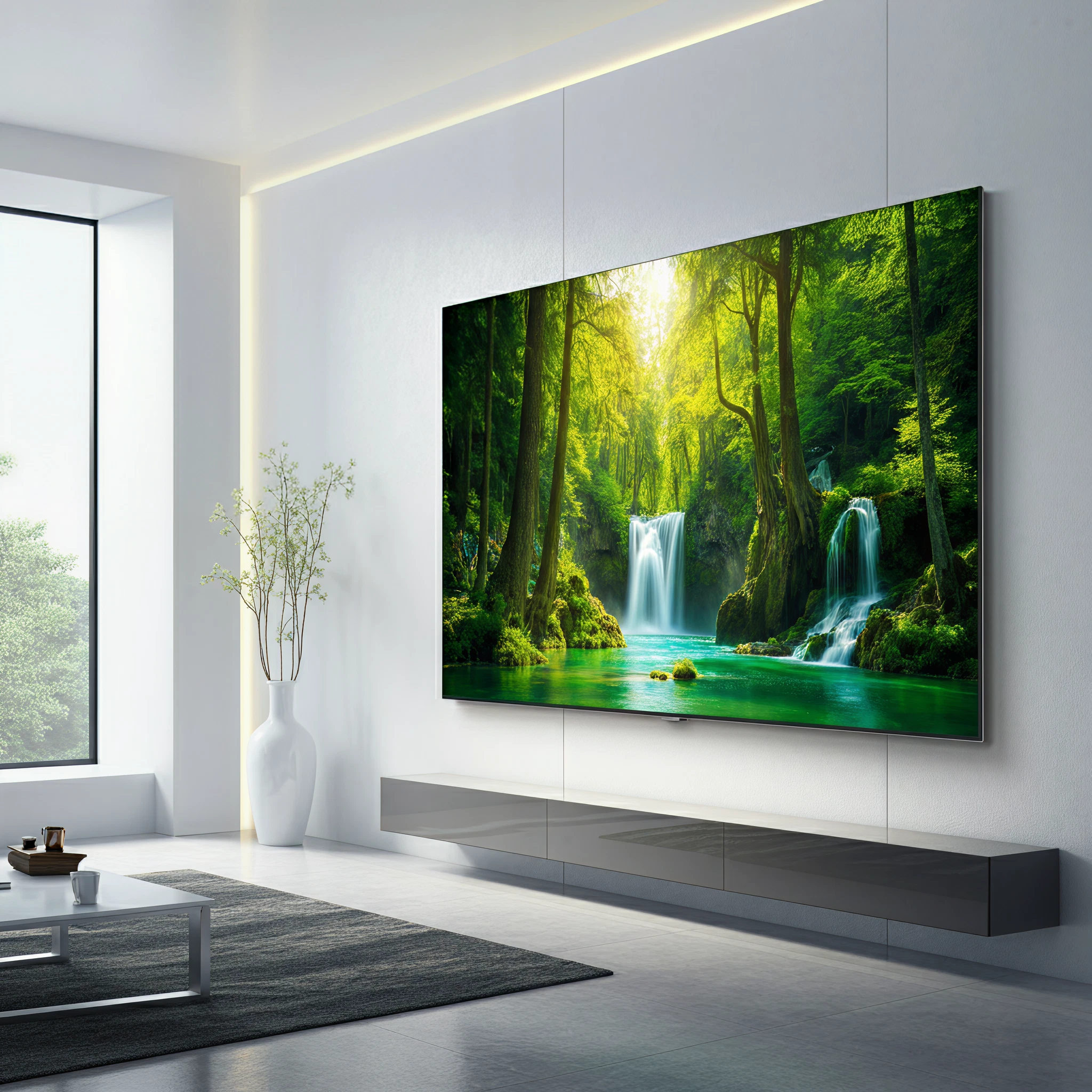The term “120 in TV” typically refers to a 120Hz refresh rate. Refresh rate is the number of times the image on your screen is updated every second. A 120Hz refresh rate means the display refreshes 120 times per second. Compared to the standard 60Hz refresh rate, this results in smoother motion and reduces screen tearing or blurring.
Key takeaway:
- 60Hz TV refreshes 60 times per second (suitable for casual TV watching).
- 120Hz TV refreshes 120 times per second (ideal for fast-paced action, sports, and gaming).
Why 120Hz Matters
1. Smoother Motion for Sports & Action Scenes
One of the biggest advantages of a 120Hz refresh rate is its ability to handle fast motion effortlessly. Whether you’re watching a football game or an action-packed car chase, 120Hz ensures smooth transitions, reducing motion blur. This means you won’t miss a single detail on the screen.
2. A Game-Changer for Gamers
Gamers will particularly benefit from 120Hz TVs when gaming at higher frame rates. Paired with modern gaming consoles like PlayStation 5 or Xbox Series X, these TVs deliver stunningly smooth visuals and reduced input lag. Specific models also support technologies like VRR (Variable Refresh Rate) and ALLM (Auto Low Latency Mode), elevating the gaming experience even further.
- Input lag is critical here. With a 120Hz TV, gamers experience less delay between their controller input and what’s displayed on the screen.
3. Superior Compatibility with Modern Content
Streaming services and Blu-Ray movies optimized for high refresh rates deliver better viewing results on 120Hz TVs. It’s also future-proof for upcoming technology and content designed with higher frames per second.
Native 120Hz vs. Motion Interpolation
Not all 120Hz TVs are created equally. Here’s the difference you’ll want to know about:
Native 120Hz
Native 120Hz TVs offer an actual 120 refreshes per second, providing true benefits of this technology. These are best suited for gaming and sports.
Motion Interpolation
Some TVs use software-based “motion smoothing” or “interpolation” to mimic a higher refresh rate. While it creates smoother scenes, it can also result in the artificial “soap-opera effect,” which some viewers find distracting.
Always check if a TV supports native 120Hz for achieving the best results.
Who Should Buy a 120Hz TV?
- Sports Enthusiasts who love watching high-paced games like basketball, soccer, or Formula 1.
- Gamers who play fast action titles on platforms like PlayStation 5, Xbox Series X, or high-end PCs.
- Movie Buffs looking for the smoothest viewing experience, particularly for action and thriller films.
Top 120Hz TV Models to Consider in 2025
Based on our research and expert recommendations (see CNET’s TV reviews for reference), here are some of the best 120Hz TVs currently available:
1. LG OLED C4 (Best High-End Gaming TV)
- Screen Type: OLED
- Refresh Rate: Up to 144Hz for gaming
- Advantages: Outstanding picture quality, low input lag.
- Price: $1,600 (65-inch model).
2. TCL QM8 (Best Overall)
- Screen Type: Mini-LED
- Refresh Rate: 120Hz / 144Hz gaming support.
- Advantages: Bright display, affordable pricing for a premium experience.
- Price: $1,399 (65-inch model).
3. Samsung S95D (Best for Bright Rooms)
- Screen Type: OLED with matte finish
- Refresh Rate: 120Hz
- Advantages: Exceptional glare reduction, superior picture quality.
- Price: $1,998 (65-inch model).
4. Hisense U8N (Best Budget Gaming TV)
- Screen Type: Mini-LED
- Refresh Rate: 120Hz
- Advantages: Affordable, comes in smaller screen sizes.
- Price: $698 (55-inch model).
5. Vizio Quantum Pro (Mid-Range Option)
- Screen Type: LED LCD
- Refresh Rate: 120Hz
- Advantages: Solid color contrast, midrange pricing.
- Price: $648 (65-inch model).
Potential Drawbacks of 120Hz TVs
1. Higher Cost
120Hz TVs are typically priced higher than their 60Hz counterparts. However, as the technology becomes more common, prices are gradually becoming more affordable.
2. Limited Content Availability
While gaming consoles and streaming platforms offer 120Hz content, not all TV channels or streaming services support it. If most of your content runs at 60Hz, the benefits of a 120Hz TV may feel redundant.
3. Requires High-Speed Connections
Ensure your TV supports HDMI 2.1. This allows compatible devices (like gaming consoles) to run content at 120Hz smoothly.
FAQs About 120 in TV
Is 120Hz Worth It?
If you’re a gamer, sports enthusiast, or someone who enjoys top-tier picture quality, absolutely! However, those watching standard content like cable TV or older movies may not notice as much difference.
Do I Need 120Hz for Gaming?
For next-gen gaming consoles and PCs that output 120 FPS (frames per second), a 120Hz TV is a must. For casual gaming, a 60Hz TV will suffice.
What’s the Difference Between 60Hz and 120Hz?
- 60Hz: Good for standard TV shows and movies.
- 120Hz: Perfect for fast motion and gaming, reducing motion blur significantly.
Are 120Hz TVs Good for Sports?
Yes! They provide smoother transitions and reduce motion blur during fast-paced sequences, such as a basketball dunk or a soccer goal replay.
Final Thoughts
120Hz TVs are a worthwhile investment for anyone seeking smoother motion, enhanced gaming experiences, and future-proof technology. From high-resolution OLED screens to budget-friendly Mini-LED options, there’s a 120Hz TV for every type of buyer.
Want to learn more or explore the best TV options? Check out our curated list of top-rated 120Hz models and make an informed choice.
Image Suggestions:
- An infographic comparing 60Hz and 120Hz refresh rates.
- Lifestyle shot of a family watching a 120Hz TV with vibrant visuals.
- A dedicated gaming setup with glowing lights, featuring a 120Hz TV.
Alt Text Ideas:
- “Comparison of 60Hz vs 120Hz refresh rates in TVs for gaming and sports.”
- “Family enjoying sports on a 120Hz TV in a modern living room.”
- “Gaming setup showcasing a 120Hz TV with RGB lighting and controller.”








